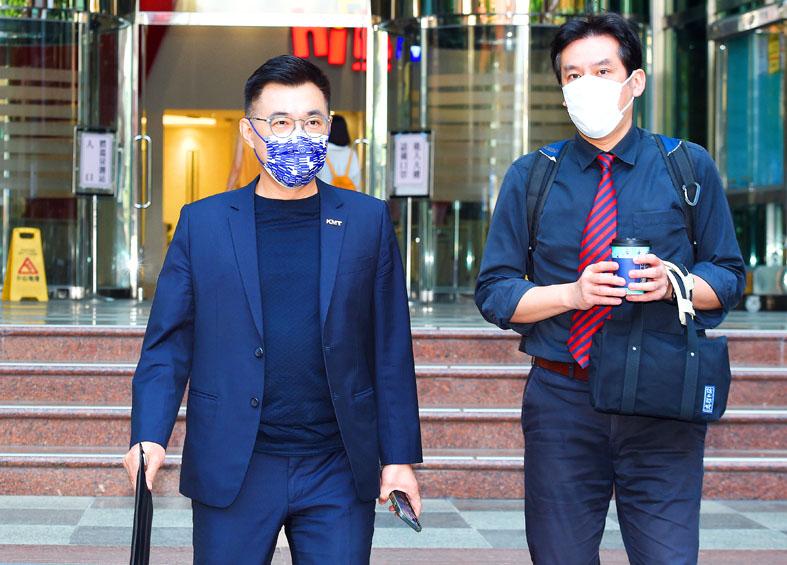Former president Ma Ying-jeou (馬英九) would be an “ideal” person to represent the Chinese Nationalist Party (KMT) in promoting cross-strait exchanges, KMT Chairman Johnny Chiang (江啟臣) said yesterday.
Chiang — who has taken a leave of absence from his role as KMT chairman to campaign for re-election — made the remarks in an interview with radio talk show host Huang Wei-han (黃暐瀚).
Ma would be the “most ideal candidate” to carry out exchanges across the Taiwan Strait on behalf of the KMT, Chiang said.

Photo: Liao Chen-huei, Taipei Times
When Chiang registered his candidacy for KMT chairperson in Taipei on Tuesday last week, he listed as one of his five main goals for a second term the appointment of a special representative to promote cross-strait exchanges on behalf of the party.
Chiang yesterday said that he would seek Ma’s support in the upcoming election, but that he would respect the former president’s decision.
The KMT is scheduled to hold elections for its chairperson and delegates of its National Congress on Sept. 25, after they were postponed from July 24 due to a domestic COVID-19 outbreak in May.
Besides Chiang, the other candidates for KMT chair are former New Taipei City mayor Eric Chu (朱立倫), Sun Yat-sen School president Chang Ya-chung (張亞中) and former Changhua County commissioner Cho Po-yuan (卓伯源).
Chu, who was KMT chairman from January 2015 to January 2016, is Chiang’s main rival.
Chiang won a by-election on March 7 last year to replace former KMT chairman and vice president Wu Den-yih (吳敦義).
In the hour-long interview, Chiang expressed the hope that KMT members would unite after the election.
Asked about the referendums to be held on Dec. 18, Chiang said that they would inevitably have an effect on subsequent elections, as well as a competition between the KMT and the Democratic Progressive Party.
As the referendums are not tied to a national election, voter turnout would be key, said Chiang, whose party initiated two of the referendum proposals.
Commenting on President Tsai Ing-wen (蔡英文) receiving the first dose of the domestic Medigen COVID-19 vaccine on Monday, Chiang said that the president had chosen to receive the Medigen vaccine, but the public should be given options besides being vaccinated with the Medigen vaccine “or having to wait.”
Separately yesterday, Jaw Shaw-kong (趙少康), chairman of the Broadcasting Corp of China, said that the “Blue Fighters” faction of the KMT that he is organizing is not the same as the New KMT Alliance.
The New KMT Alliance, in which Jaw was involved, was a faction of the KMT that eventually split from the party to form the New Party in 1993.
“What the KMT lacks most is enthusiasm and combativeness,” Jaw wrote on Facebook, describing the “Blue Fighters” as having a special kind of philosophy and attitude toward politics.
Additional reporting by Chen Yun

Taiwan has received more than US$70 million in royalties as of the end of last year from developing the F-16V jet as countries worldwide purchase or upgrade to this popular model, government and military officials said on Saturday. Taiwan funded the development of the F-16V jet and ended up the sole investor as other countries withdrew from the program. Now the F-16V is increasingly popular and countries must pay Taiwan a percentage in royalties when they purchase new F-16V aircraft or upgrade older F-16 models. The next five years are expected to be the peak for these royalties, with Taiwan potentially earning

STAY IN YOUR LANE: As the US and Israel attack Iran, the ministry has warned China not to overstep by including Taiwanese citizens in its evacuation orders The Ministry of Foreign Affairs (MOFA) yesterday rebuked a statement by China’s embassy in Israel that it would evacuate Taiwanese holders of Chinese travel documents from Israel amid the latter’s escalating conflict with Iran. Tensions have risen across the Middle East in the wake of US and Israeli airstrikes on Iran beginning Saturday. China subsequently issued an evacuation notice for its citizens. In a news release, the Chinese embassy in Israel said holders of “Taiwan compatriot permits (台胞證)” issued to Taiwanese nationals by Chinese authorities for travel to China — could register for evacuation to Egypt. In Taipei, the ministry yesterday said Taiwan

Taiwan is awaiting official notification from the US regarding the status of the Agreement on Reciprocal Trade (ART) after the US Supreme Court ruled US President Donald Trump's global tariffs unconstitutional. Speaking to reporters before a legislative hearing today, Premier Cho Jung-tai (卓榮泰) said that Taiwan's negotiation team remains focused on ensuring that the bilateral trade deal remains intact despite the legal challenge to Trump's tariff policy. "The US has pledged to notify its trade partners once the subsequent administrative and legal processes are finalized, and that certainly includes Taiwan," Cho said when asked about opposition parties’ doubts that the ART was

If China chose to invade Taiwan tomorrow, it would only have to sever three undersea fiber-optic cable clusters to cause a data blackout, Jason Hsu (許毓仁), a senior fellow at the Hudson Institute and former Chinese Nationalist Party (KMT) legislator, told a US security panel yesterday. In a Taiwan contingency, cable disruption would be one of the earliest preinvasion actions and the signal that escalation had begun, he said, adding that Taiwan’s current cable repair capabilities are insufficient. The US-China Economic and Security Review Commission (USCC) yesterday held a hearing on US-China Competition Under the Sea, with Hsu speaking on